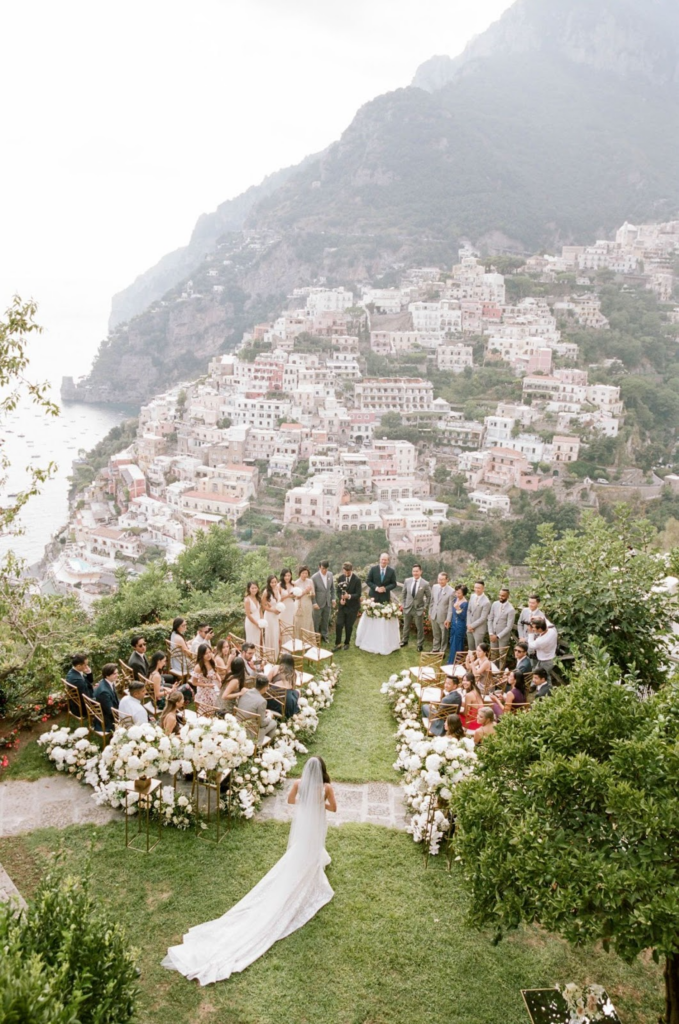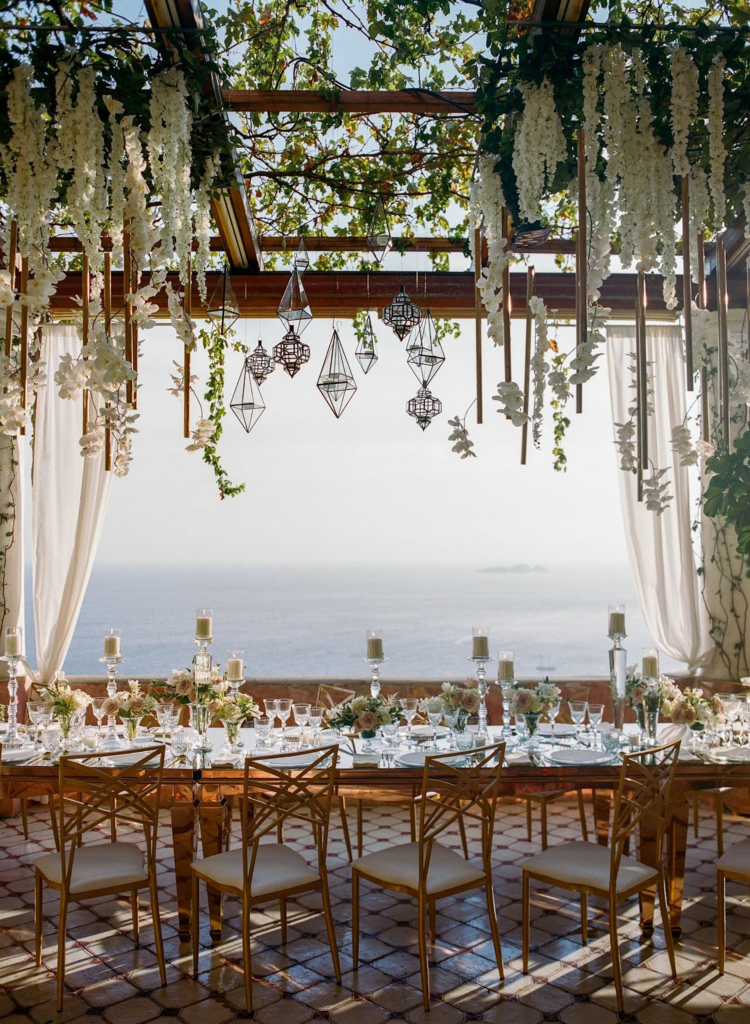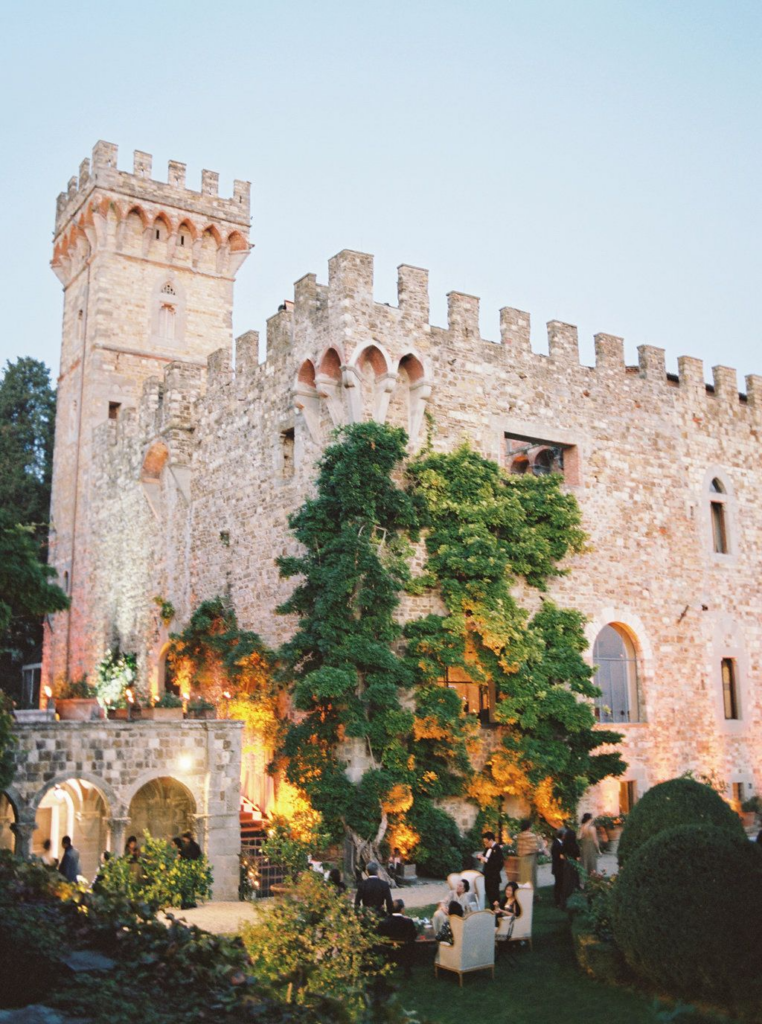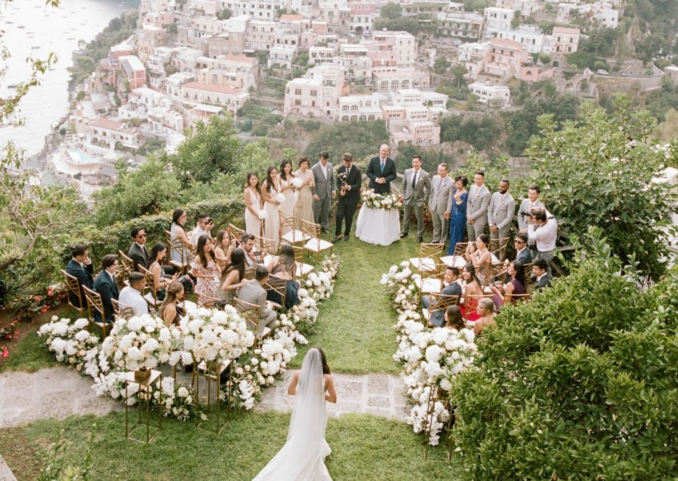Dreaming of a romantic destination wedding in Italy – one of the best destination countries for a memorable wedding? Planning a wedding from overseas might seem daunting, but with the right approach and some helpful tips, you can bring your Italian wedding vision to life. In this article, we’ll guide you through the process of planning a destination wedding in Italy, ensuring that every detail is taken care of, no matter where you are in the world.
How to Plan a Destination Wedding in Italy if You’re Overseas
1. Choose the Perfect Location

Italy offers a plethora of breathtaking wedding destinations, each with its own unique charm. Consider popular choices like Florence, Rome, Amalfi Coast, Tuscany, or Lake Como. Research each location’s ambiance, local attractions, and venue options to find the one that resonates most with your wedding vision.
2. Hire a Local Wedding Planner

Partnering with a local wedding planner who specializes in destination weddings is crucial. They possess the necessary expertise, contacts, and local knowledge to make your wedding planning experience seamless. A trusted wedding planner will assist you with venue selection, legal requirements, vendor coordination, and overall logistics, saving you time and stress.
3. Understand Legal Requirements
Familiarize yourself with the legalities of getting married in Italy. Non-residents are typically required to submit specific documents, such as a declaration of intent to marry, birth certificates, and valid passports.
When planning a destination wedding in Italy as a non-resident, you may need to provide the following documents:
- Declaration of Intent to Marry: This document states your intention to marry and is usually obtained from your local embassy or consulate in Italy. It may also be known as a “Nulla Osta” or “Certificate of No Impediment.
- Birth Certificates: You and your partner will likely need to provide your original birth certificates, which should be translated into Italian and authenticated. The translation and authentication process can be done through an official translator or an apostille, depending on the requirements of the specific Italian region.
- Valid Passports: Ensure that you and your partner have valid passports that will remain valid for at least six months after the wedding date. This is essential for legal purposes and travel to Italy.
- Single Status Affidavit: Some regions in Italy may require a sworn affidavit stating that you and your partner are both single and eligible to marry. This document can be obtained from your home country’s embassy or consulate.
- Divorce or Death Certificates (if applicable): If either you or your partner were previously married, you will likely need to provide divorce decrees or death certificates to prove the termination of previous marriages.
- Translations and Apostilles: Depending on your nationality and the region of Italy where you plan to marry, you may need to have certain documents translated into Italian by an official translator. Additionally, some documents may require an apostille, which is an internationally recognized certification of authenticity.
Please note that the specific documents and requirements can vary depending on the region in Italy where you plan to get married. It’s essential to consult with your wedding planner or the local authorities in your chosen wedding destination to ensure you have the correct and up-to-date information regarding the required documents for your specific circumstances.
4. Visit the Destination
Whenever possible, plan a pre-wedding visit to your chosen destination. This will allow you to personally assess venues, meet vendors, and finalize details. If visiting in person is not feasible, schedule video calls with your wedding planner and vendors to get a better sense of the venue and their services.
5. Find the Perfect Venue

Italy is renowned for its enchanting venues, including historic villas, vineyards, castles, and seaside resorts. Work closely with your wedding planner to select a venue that reflects your style and accommodates your guest count. Consider factors like the ceremony and reception spaces, on-site accommodations, catering options, and the overall ambiance. Here are a few specific regions and places in Italy known for their charm and beauty:
- Amalfi Coast: With its breathtaking coastline, picturesque towns like Positano and Ravello, and stunning views of the Mediterranean Sea, the Amalfi Coast is an idyllic setting for a romantic wedding. Imagine exchanging vows overlooking the azure waters or celebrating in a cliffside villa with panoramic views.
- Tuscany: Known for its rolling hills, vineyards, and historic cities like Florence and Siena, Tuscany offers a rustic and elegant backdrop for weddings. Consider saying “I do” in a charming countryside villa or a restored farmhouse surrounded by vineyards, followed by a reception featuring Tuscan cuisine and renowned local wines.
- Lake Como: Nestled in the Italian Alps, Lake Como is renowned for its breathtaking scenery and glamorous atmosphere. Imagine a lakeside ceremony in a luxurious villa or a historic castle, followed by a boat ride for you and your guests, and a reception on the terrace overlooking the serene lake.

- Italian Castles: Italy is home to numerous castles that can be rented for weddings, adding a touch of medieval grandeur to your special day. Castello di Vicarello in Tuscany, Castello di Vincigliata in Florence, and Castello di Celsa in Siena are just a few examples of magnificent castles available for exclusive weddings.
- Venice: The romantic city of Venice offers a truly unique setting for a destination wedding. Exchange vows in a historic Venetian palazzo overlooking the canals, arrive at the ceremony in a traditional gondola, and celebrate with a lavish reception immersed in Venetian charm.
- Sicily: For a wedding that combines history, culture, and stunning landscapes, consider the island of Sicily. From ancient Greek temples in Agrigento to the baroque architecture of cities like Palermo and Catania, Sicily offers a diverse range of venues for a one-of-a-kind wedding experience.
6. Explore Italian Cuisine
When planning a destination wedding in Italy, don’t forget to explore the diverse and mouthwatering world of Italian cuisine. While pizza and pasta are undoubtedly delicious, there is so much more to discover. Here are some food tips to consider for your wedding menu:

- Regional Specialties: Each region in Italy has its own culinary treasures. Embrace the local flavors by incorporating regional specialties into your menu. For example, in Tuscany, you can savor dishes like bistecca alla fiorentina (Florentine steak) or ribollita (a hearty vegetable soup). In Sicily, indulge in arancini (fried rice balls) or cannoli (sweet pastries filled with ricotta cream).
- Antipasti Selection: Start your wedding reception with an array of antipasti, the traditional Italian appetizers. Include a variety of cured meats, cheeses, marinated vegetables, bruschetta, and seafood to tantalize your guests’ taste buds and showcase the flavors of Italy.
- Seafood Delights: If you’re having a coastal wedding, take advantage of the fresh seafood options. Offer dishes such as grilled or baked fish, seafood risotto, or even a raw bar with oysters and shrimp.

- Farm-to-Table Ingredients: Italy is renowned for its emphasis on fresh, locally sourced ingredients. Work with your caterer to create a menu that highlights seasonal produce, artisanal cheeses, and high-quality meats. Incorporate dishes that feature ingredients from local farmers’ markets to add an authentic touch to your dining experience.
- Desserts and Dolci: End your wedding celebration on a sweet note with an assortment of Italian desserts. Offer classics like tiramisu, panna cotta, cannoli, or a traditional wedding cake with Italian influences, such as a millefoglie (layers of puff pastry and cream) or a torta caprese (chocolate and almond cake).
- Wine Pairings: Italy is renowned for its exceptional wines. Consult with a sommelier or your wedding planner to curate a selection of Italian wines that pair perfectly with your menu. From crisp whites in the north to bold reds in Tuscany and rich dessert wines in Sicily, there is a wine to suit every palate and enhance the dining experience.
7. Budget Considerations
When planning a destination wedding in Italy, it’s important to consider the average costs associated with different vendors. Keep in mind that these costs can vary depending on the specific location, venue, and level of services you choose. Here are some average cost ranges for common wedding vendors in Italy:

- Venue: The cost of a wedding venue in Italy can vary significantly depending on factors such as location, popularity, and amenities. On average, you can expect to spend between €4,000 and €15,000 for a venue rental.
- Catering: Italian cuisine is renowned, and catering costs can range from €100 to €300 per person, depending on the menu, the number of courses, and the level of service.
- Photographer: Professional wedding photographers in Italy typically charge between €1,500 and €4,000, depending on their experience, reputation, and the duration of coverage.
- Videographer: Videography services can range from €1,500 to €4,000 or more, depending on the length of coverage, the style of video, and additional services such as drone footage or same-day edits.
- Wedding Planner: Hiring a wedding planner is highly recommended for a destination wedding in Italy. Wedding planner fees can vary, but expect to budget between 10% and 15% of your overall wedding budget for their services.

- Florist: The cost of floral arrangements can vary depending on the types of flowers, the complexity of the designs, and the size of the wedding. On average, floral expenses can range from €1,500 to €5,000 or more.
- Music and Entertainment: Hiring live musicians or a DJ for your wedding can cost between €1,000 and €3,000, depending on the number of performers, the duration of their services, and any additional equipment required.
- Wedding Cake: The cost of a wedding cake in Italy can range from €300 to €800, depending on the size, design, and complexity of the cake.
- Transportation: Transportation costs can vary depending on the distance between venues and the number of guests. Budget for transportation expenses such as airport transfers, shuttle services, and transportation for the wedding party, which can range from €500 to €2,000 or more.
Remember that these are average cost ranges, and it’s important to discuss specific details and requirements with your wedding planner and vendors. They will be able to provide more accurate estimates based on your preferences and the specific location in Italy where you plan to have your destination wedding.
8. Customize Your Italian Experience
Incorporate elements of Italian culture into your wedding to create a memorable experience. Consider incorporating Italian cuisine, wines, music, and traditions into your celebration. Embrace the local customs and seek guidance from your wedding planner on incorporating authentic Italian touches. Incorporate elements of Italian culture into your wedding for a memorable experience. Here are some ideas:

- La Despedida de Soltera: Have a bachelorette party Italian-style with activities like wine tasting or cooking classes.
- Italian Cuisine: Feature Italian dishes like bruschetta, antipasti, handmade pasta, and regional specialties. Don’t forget traditional desserts.
- Italian Wines: Pair your menu with Italian wines, from Prosecco to Chianti and Barolo.
- Live Music and Tarantella Dance: Hire local musicians for traditional Italian music and encourage guests to join in the lively tarantella dance.
- Olive Oil Ceremony: Symbolize the blending of your lives by mixing two types of olive oil in a decorative vessel.
- Confetti: Shower guests with confetti, small colorful candies, for a joyful touch.
- Italian Wedding Favors: Offer bomboniere, traditional Italian wedding favors, such as sugared almonds or personalized items reflecting Italian culture.
9. Guest Accommodations and Travel

Help your guests navigate travel logistics by providing comprehensive information about accommodations, local transportation, and nearby attractions. Consider arranging group rates with preferred hotels and suggest local activities or tours for your guests to enjoy during their stay. A dedicated wedding website or information packet can be a valuable resource for your guests.
10. Plan for the Unexpected
No matter how meticulously you plan, unexpected challenges may arise. Prepare for contingencies, such as weather changes, travel disruptions, or last-minute vendor adjustments. Maintain open communication with your wedding planner, who can troubleshoot and provide alternative solutions if necessary.
READ MORE:




